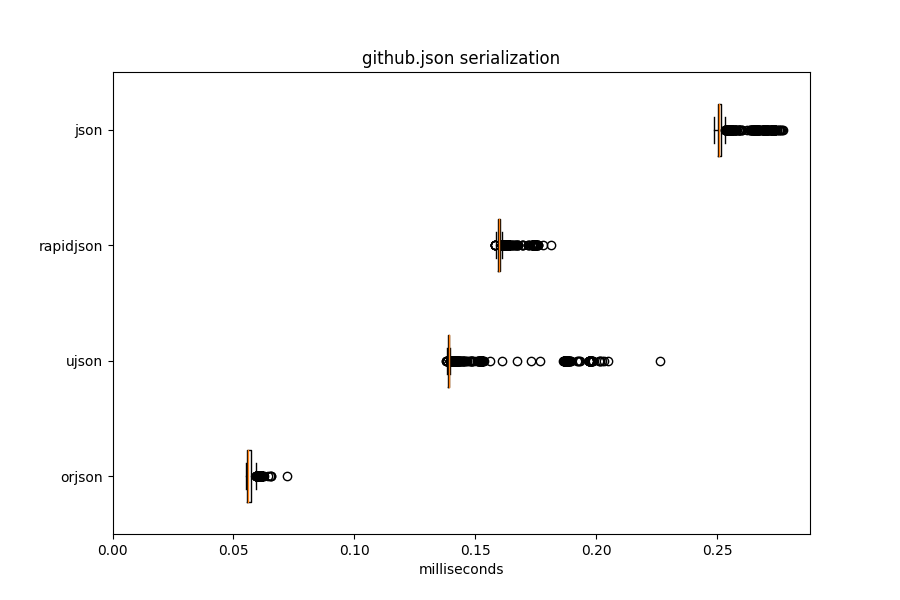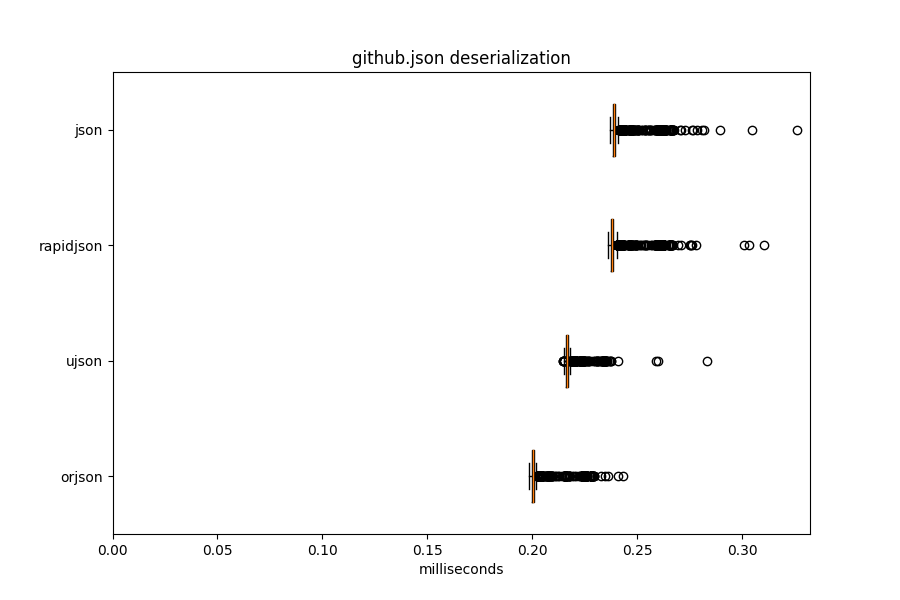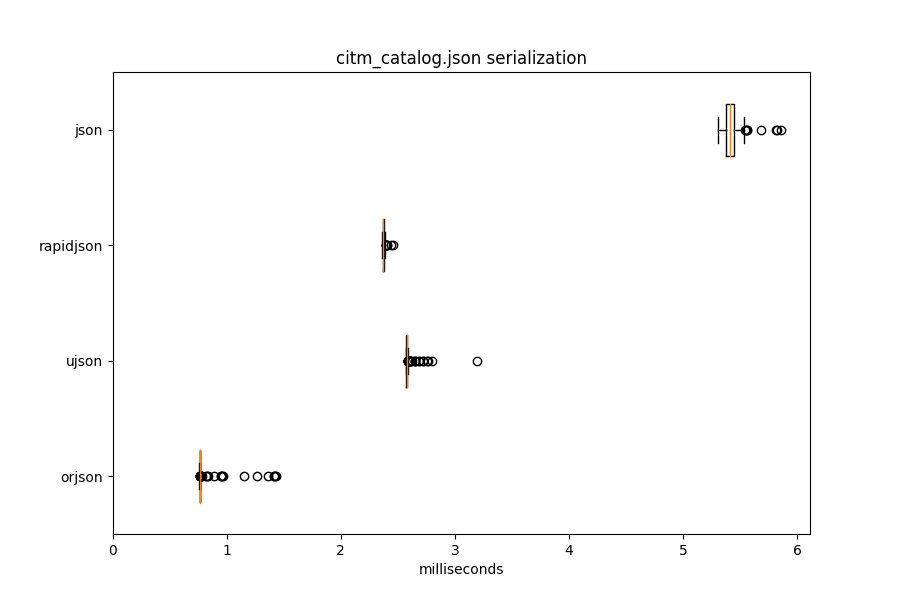orjson is a fast, correct JSON library for Python. It benchmarks as the fastest Python library for JSON and has comprehensive unit, integration, and interoperability tests.
Its serialization performance is 2x to 3x the nearest other library and 4.5x to 11.5x the standard library. Its deserialization performance is 1.05x to 1.2x the nearest other library and 1.2x to 4x the standard library.
It differs in behavior from other Python JSON libraries in supporting
datetimes, not supporting subclasses without a default hook,
serializing UTF-8 to bytes rather than escaped ASCII (e.g., "好" rather than
"\\u597d") by default, having strict UTF-8 conformance, not supporting pretty
printing, and not supporting all standard library options.
It supports CPython 3.6 and 3.7.
To install a manylinux wheel from PyPI:
pip install --upgrade orjsonTo build a release wheel from source, assuming a Rust nightly toolchain and Python environment:
git clone --recurse-submodules https://github.com/ijl/orjson.git && cd orjson
pip install --upgrade pyo3-pack
pyo3-pack build --release --strip --interpreter python3.7There is no runtime dependency other than a manylinux environment (i.e., deploying this does not require Rust or non-libc type libraries.)
def dumps(obj: Any, default=Optional[Callable[Any]]) -> bytes: ...dumps() serializes Python objects to JSON. It natively serializes
str, dict, list, tuple, int, float, datetime.datetime,
datetime.date, datetime.time, and None instances. It supports
arbitrary types through default. It does not serialize
subclasses of supported types natively, but default may be used.
It raises JSONEncodeError on an unsupported type. This exception message
describes the invalid object.
It raises JSONEncodeError on a str that contains invalid UTF-8.
It raises JSONEncodeError on an integer that exceeds 64 bits. This is the same
as the standard library's json module.
It raises JSONEncodeError if a dict has a key of a type other than str.
It raises JSONEncodeError if the output of default recurses to handling by
default more than five levels deep.
JSONEncodeError is a subclass of TypeError. This is for compatibility
with the standard library.
import orjson
try:
val = orjson.dumps(...)
except orjson.JSONEncodeError:
raiseTo serialize arbitrary types, specify default as a callable that returns
a supported type. default may be a function, lambda, or callable class
instance.
>>> import orjson, numpy
>>> def default(obj):
if isinstance(obj, numpy.ndarray):
return obj.tolist()
>>> orjson.dumps(numpy.random.rand(2, 2), default=default)
b'[[0.08423896597867486,0.854121264944197],[0.8452845446981371,0.19227780743524303]]'If the default callable does not return an object, and an exception
was raised within the default function, an exception describing this is
raised. If no object is returned by the default callable but also
no exception was raised, it falls through to raising JSONEncodeError on an
unsupported type.
The default callable may return an object that itself
must be handled by default up to five levels deep before an exception
is raised.
def loads(obj: Union[bytes, str]) -> Union[dict, list, int, float, str, None]: ...loads() deserializes JSON to Python objects.
It raises JSONDecodeError if given an invalid type or invalid
JSON.
JSONDecodeError is a subclass of ValueError. This is for
compatibility with the standard library.
import orjson
try:
val = orjson.loads(...)
except orjson.JSONDecodeError:
raiseErrors with tzinfo result in JSONEncodeError being raised.
There are slight differences in output between libraries. The differences are not an issue for interoperability. Note orjson returns bytes. Its output is slightly smaller as well.
>>> import orjson, ujson, rapidjson, json
>>> data = {'bool': True, '🐈':'哈哈', 'int': 9223372036854775807, 'float': 1.337e+40}
>>> orjson.dumps(data)
b'{"bool":true,"\xf0\x9f\x90\x88":"\xe5\x93\x88\xe5\x93\x88","int":9223372036854775807,"float":1.337e40}'
>>> ujson.dumps(data)
'{"bool":true,"\\ud83d\\udc08":"\\u54c8\\u54c8","int":9223372036854775807,"float":1.337000000000000e+40}'
>>> rapidjson.dumps(data)
'{"bool":true,"\\uD83D\\uDC08":"\\u54C8\\u54C8","int":9223372036854775807,"float":1.337e+40}'
>>> json.dumps(data)
'{"bool": true, "\\ud83d\\udc08": "\\u54c8\\u54c8", "int": 9223372036854775807, "float": 1.337e+40}'orjson serializes datetime.datetime objects to
RFC 3339 format, a subset of
ISO 8601.
datetime.datetime objects must have tzinfo set. For UTC timezones,
datetime.timezone.utc is sufficient. For other timezones, tzinfo
must be a timezone object from the pendulum, pytz, or dateutil libraries.
>>> import orjson, datetime, pendulum
>>> orjson.dumps(
datetime.datetime.fromtimestamp(4123518902).replace(tzinfo=datetime.timezone.utc)
)
b'"2100-09-01T21:55:02+00:00"'
>>> orjson.dumps(
datetime.datetime(2018, 12, 1, 2, 3, 4, 9, tzinfo=pendulum.timezone('Australia/Adelaide'))
)
b'"2018-12-01T02:03:04.9+10:30"'datetime.time objects must not have a tzinfo. datetime.date objects
will always serialize.
>>> import orjson, datetimem
>>> orjson.dumps(datetime.date(1900, 1, 2))
b'"1900-01-02"'
>>> orjson.dumps(datetime.time(12, 0, 15, 291290))
b'"12:00:15.291290"'It is faster to have orjson serialize datetime objects than to do so
before calling dumps(). If using an unsupported type such as
pendulum.datetime, use default.
orjson raises an exception on invalid UTF-8. This is necessary because Python 3 str objects may contain UTF-16 surrogates. The standard library's json module accepts invalid UTF-8.
>>> import orjson, ujson, rapidjson, json
>>> orjson.dumps('\ud800')
JSONEncodeError: str is not valid UTF-8: surrogates not allowed
>>> ujson.dumps('\ud800')
UnicodeEncodeError: 'utf-8' codec ...
>>> rapidjson.dumps('\ud800')
UnicodeEncodeError: 'utf-8' codec ...
>>> json.dumps('\ud800')
'"\\ud800"'>>> import orjson, ujson, rapidjson, json
>>> orjson.loads('"\\ud800"')
JSONDecodeError: unexpected end of hex escape at line 1 column 8: line 1 column 1 (char 0)
>>> ujson.loads('"\\ud800"')
''
>>> rapidjson.loads('"\\ud800"')
ValueError: Parse error at offset 1: The surrogate pair in string is invalid.
>>> json.loads('"\\ud800"')
'\ud800'The library has comprehensive tests. There are unit tests against the roundtrip, jsonchecker, and fixtures files of the nativejson-benchmark repository. It is tested to not crash against the Big List of Naughty Strings. It is tested to not leak memory. It is tested to be correct against input from the PyJFuzz JSON fuzzer. It is tested to not crash against and not accept invalid UTF-8. There are integration tests exercising the library's use in web servers (uwsgi and gunicorn, using multiprocess/forked workers) and when multithreaded. It also uses some tests from the ultrajson library.
Serialization and deserialization performance of orjson is better than ultrajson, rapidjson, or json. The benchmarks are done on fixtures of real data:
-
twitter.json, 631.5KiB, results of a search on Twitter for "一", containing CJK strings, dictionaries of strings and arrays of dictionaries, indented.
-
github.json, 55.8KiB, a GitHub activity feed, containing dictionaries of strings and arrays of dictionaries, not indented.
-
citm_catalog.json, 1.7MiB, concert data, containing nested dictionaries of strings and arrays of integers, indented.
-
canada.json, 2.2MiB, coordinates of the Canadian border in GeoJSON format, containing floats and arrays, indented.
| Library | Median latency (milliseconds) | Operations per second | Relative (latency) |
|---|---|---|---|
| orjson | 0.48 | 2077.6 | 1 |
| ujson | 1.48 | 664.6 | 3.09 |
| rapidjson | 1.59 | 626.5 | 3.32 |
| json | 2.24 | 443.9 | 4.68 |
| Library | Median latency (milliseconds) | Operations per second | Relative (latency) |
|---|---|---|---|
| orjson | 2.38 | 418.8 | 1 |
| ujson | 2.67 | 373 | 1.12 |
| rapidjson | 2.78 | 359.5 | 1.16 |
| json | 2.77 | 359.7 | 1.16 |
| Library | Median latency (milliseconds) | Operations per second | Relative (latency) |
|---|---|---|---|
| orjson | 0.06 | 17745 | 1 |
| ujson | 0.14 | 7107.1 | 2.49 |
| rapidjson | 0.16 | 6253.9 | 2.86 |
| json | 0.25 | 3972.5 | 4.49 |
| Library | Median latency (milliseconds) | Operations per second | Relative (latency) |
|---|---|---|---|
| orjson | 0.2 | 4929.7 | 1 |
| ujson | 0.22 | 4605.2 | 1.08 |
| rapidjson | 0.24 | 4166.5 | 1.19 |
| json | 0.24 | 4150.8 | 1.19 |
| Library | Median latency (milliseconds) | Operations per second | Relative (latency) |
|---|---|---|---|
| orjson | 0.76 | 1302 | 1 |
| ujson | 2.58 | 387.2 | 3.38 |
| rapidjson | 2.37 | 421.1 | 3.11 |
| json | 5.41 | 184.4 | 7.09 |
| Library | Median latency (milliseconds) | Operations per second | Relative (latency) |
|---|---|---|---|
| orjson | 4.28 | 233.1 | 1 |
| ujson | 5.06 | 197.2 | 1.18 |
| rapidjson | 5.82 | 171.7 | 1.36 |
| json | 5.81 | 171.8 | 1.36 |
| Library | Median latency (milliseconds) | Operations per second | Relative (latency) |
|---|---|---|---|
| orjson | 4.04 | 247.7 | 1 |
| ujson | 8.43 | 118.6 | 2.09 |
| rapidjson | 43.93 | 22.7 | 10.88 |
| json | 47.23 | 21.1 | 11.7 |
| Library | Median latency (milliseconds) | Operations per second | Relative (latency) |
|---|---|---|---|
| orjson | 6.69 | 147.6 | 1 |
| ujson | 7.17 | 139.4 | 1.07 |
| rapidjson | 26.77 | 37.4 | 4 |
| json | 26.59 | 37.6 | 3.97 |
This was measured using orjson 1.3.0 on Python 3.7.2 and Linux.
The results can be reproduced using the pybench and graph scripts.
orjson is dual licensed under the Apache 2.0 and MIT licenses. It contains tests from the hyperjson and ultrajson libraries. It is implemented using the serde_json and pyo3 libraries.







